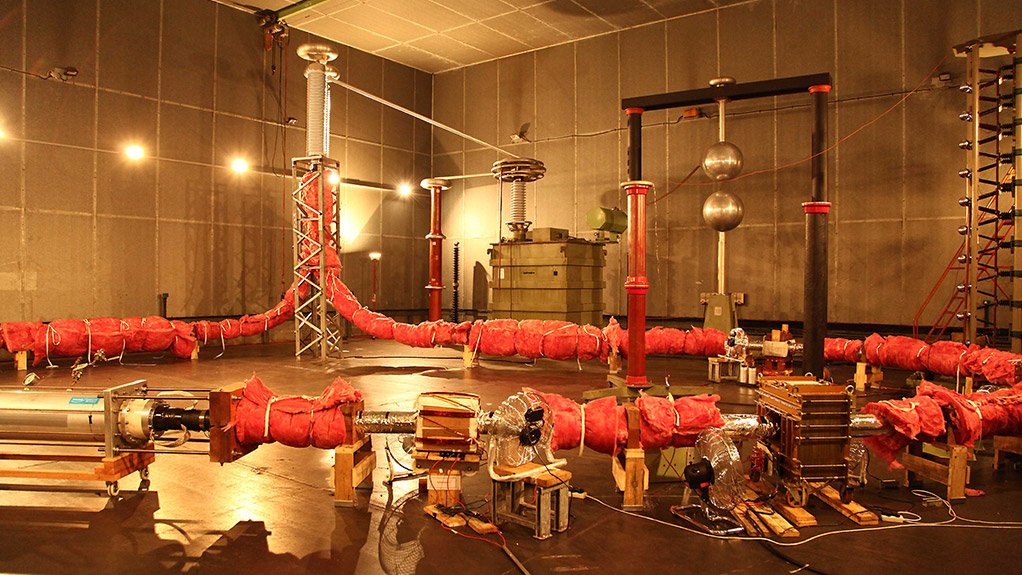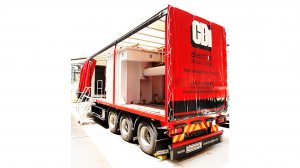Government’s efforts to advance South Africa’s manufacturing capability and boost the country’s international competitiveness through incentive mechanisms was in evidence on Tuesday, as a new high-voltage (HV) cable manufacturing facility – partly funded by government – was officially introduced to the market.
The R150-million CBI electric: African cables (CBI) facility, in Vereeniging, would become the first in sub-Saharan Africa to design and manufacture HV underground electric cables up to 275 kV with conductor sizes of up to 2500 mm².
These new cables would enable large South African energy consumers, such as municipalities and metropoles, to achieve a distribution of up to 350 MVA, 132 kV, and 547 MVA, 275 kV, on a single cable circuit.
Moreover, production capacity of the new plant would exceed 20 km a week, resulting in shorter project lead times.
The first recipient of cables from the facility would be the City of Cape Town, which would receive a 132 kV, 1 600 mm² underground cable system in June, while CBI was also currently involved in installing a 400 kV cable system at State-owned power utility Eskom’s Ingula pumped storage system, in KwaZulu-Natal.
CBI CEO Alan Dickson said at the launch of the facility that the plant and machinery had been funded by shareholders and further supported by the Department of Trade and Industry’s (DTI’s) Manufacturing Competitiveness Enhancement Programme (MCEP), which contributed 35%, or R45-million, of the total capital investment.
The MCEP, which was one of the key action programmes of the Industrial Policy Action Plan (Ipap), provided enhanced manufacturing support aimed at encouraging manufacturers to upgrade their production facilities in a manner that “sustained employment and [increased] value-addition in the short- to medium-term”.
“The DTI has been very supportive [of the facility], of which construction started in March 2013. Our motivation for development of the operation came as we realised about three-and-a-half years ago that, while we had undergone multiple technology upgrades over the last 30 years, the capability of the plant remained the same,” Dickson commented.
After identifying the need for an extension of the existing plant’s manufacturing capabilities, CBI initiated a strategic review of the company, which revealed that the customer required a turnkey solution that provided an increase in product load capacity and serviced increased voltage requirements.
South Africa’s growing electricity demand as well as an increasing copper price further bolstered the argument for the capacity expansion.
“We also realised that the African market was starting to open up and that we couldn’t keep tinkering with our current capability, which would not keep us relevant on the continent,” Dickson noted.
Also speaking at the launch on Tuesday, Trade and Industry Minister Dr Rob Davies described the facility as a concrete example of government’s efforts to boost industrialisation in South Africa through “bolder” support programmes and interventions.
He further cited the Ipap
, which had, thus far, seen over R55-billion in industrial development investment.
The DTI had also leveraged the designation policy instrument to increase support for domestic manufacturing, designating electrical cables for local production and content in the public-sector procurement system and legislating that a percentage of these components used in government tender contracts would be required to have been locally produced.
“We’re not doing this to protect unsustainable businesses against competition, but rather to promote their competitiveness and boost manufacturing. As a result, the designation of electric cables has enabled [CBI] to grow and expand,” Davies noted.
In addition to the expansion of its cable manufacturing facility, CBI, a subsidiary of JSE-listed Reunert Group, further invested R15-million in a mobile 260 kV alternating current series resonant testing unit capable of conducting partial on-site discharge tests to ensure that the supplied cable was able to conduct at and above normal operating voltages.
The company also boasted a manufacturing division specialising in the installation and maintenance of medium-voltage and HV cables.
This division, coupled with the new facility, would enable CBI to provide local HV cable clients with completely locally produced turnkey and maintenance solutions.
EMAIL THIS ARTICLE SAVE THIS ARTICLE
To subscribe email subscriptions@creamermedia.co.za or click here
To advertise email advertising@creamermedia.co.za or click here












